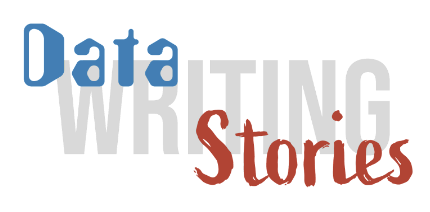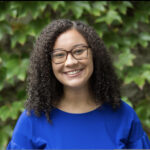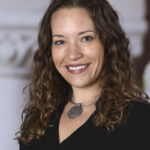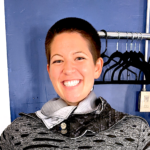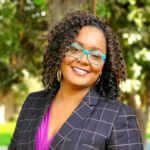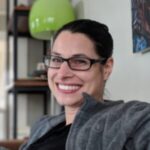There is growing interest in integrating data literacy and data science throughout the K-12 curriculum. One practice that is increasingly common in the professional world, and is generating enthusiasm from educators, is data storytelling. In data storytelling, the presentation of data and statistics are coupled with other visual and narrative elements to explain what is done to data during the process of analysis, why such analysis is important, and to communicate to a broad audience the results and their implications.
The Writing Data Stories Project (NSF IIS-1900606) brings together a team of researchers from University of California Berkeley, NC State University, and the Concord Consortium to integrate computational data analysis into the middle school science curriculum in a longitudinal, interdisciplinary way – drawing from the computer and data sciences, literacy studies, statistics, and science education to saturate the classroom with relevant tools, resources, and support. Our project seeks to introduce students to data storytelling by encouraging them to articulate their personal and social connections to data as they simultaneously engage with the statistical patterns contained therein.
Goals
The project provides a research context to address the following questions:
- How do students learn, over time, to use computational tools to structure, calculate, filter, and transform data for scientific inquiry?
- What patterns of engagement in scientific practices are supported by the integration of computational data analysis and visualizations into the science curriculum?
- What new literacy practices might support engaging oral and written arguments and explanations using data and visualizations as evidence?
Specifically, it brings together and seeks to extend three complementary research constructs. Data moves are the computational actions analysts take to transform and analyze datasets. Syncretic texts are specialized texts that blend academic discourse, such as the formulae and statistical language needed to explain data analysis, with the familiar modes of expression (including home languages, interviews, journalistic sources, and alternative forms of expression such as video, art, animation, etc.). Finally, data storytelling encourages students to weave their personal experiences, different modes of expression, and not only their findings but also their reflections and processes for working with data.
Classroom Ready Materials
The Writing Data Stories project team has developed three main sets of classroom-ready materials that can be used to support data explorations in middle school science (and mathematics or social studies) instruction. Visit the Resources page or click the icons below to learn more:
DataBytes

Quick activities (30 min or less) that invite students to connect data to their experiences and the world.
Include teacher prompts and data visualizations about everyday scientific issues from news sources or classroom curriculum.
Latest News and Publications
You can see all of our papers and major presentations on the Publications page.
-
DS+LS Workshop at ISLS 2023
Michelle is part of the organizing team for a data science focused pre-conference workshop to be held Jun 10 at ICLS 2023. The Learning Sciences in K-12 Data Science Education Pre-ISLS Workshop (LS + DS) Call for Participation: Data Science Education is fast becoming a topic of interest, but like many “hot topics,” a rush-to-market… Continue reading…
-
CoRE Work At ICLS 2023
Members of the CoRE team will be presenting multiple papers at this year’s International Conference of the Learning Sciences. This year’s presentations also demonstrate the span of our collaborations, including colleagues from NYU, Columbia Teacher’s College, MIT, and the University of Buffalo: Vogelstein, L., McBride, C., Ma, J., Wilkerson, M. H., Vogel, S., Barrales, W.,… Continue reading…
-
CoRE Kicks off BSE Faculty Conversation Series
Members of the CoRE Lab kicked off the Berkeley School of Education’s Faculty Conversations series with a panel discussion entitled Visioning New STEM Literacies Together: Reflections on the Process and Purpose of Collaborative Design. Jacob Barton, Dr. Cherise McBride, Dr. Emily Reigh, and Collette Roberto each shared brief overviews of their ongoing research projects with… Continue reading…
-
Exploring Children’s Geographies
Reigh, E., Escudé, M., Bakal, M., Rivero, E., Wei, X., Roberto, C., Hernandez, D., Yada, A., Gutierrez, K. G., & Wilkerson, M. H. (2022). Mapping racespace: Data stories as a tool for environmental and spatial justice. In BSOPS #48: “Learning Within Socio-Political Landscapes: (Re)imagining Children’s Geographies”, 79-95. doi: https://doi.org/10.58295/2375-3668.1452 Continue reading…
-
NASEM Workshop on K-12 Data Science
Michelle was a Co-Chair, with Dr. Nick Horton of Amherst College, of the National Academies of Science, Engineering, and Medicine’s Workshop on the Foundations of K-12 Data Science held in Washington, D. C. and online Sept 13-14. The convening sought to share the state of the art from research and practice in Data Science Education.… Continue reading…
Icon Credits: analytics by SBTS at thenounproject.com; data visualization by Vectors Point at thenounproject; presentation by Drishya at thenounproject.com

This material is based upon work supported by the National Science Foundation under Grant No. (IIS-1900606). Any opinions, findings, and conclusions or recommendations expressed in this material are those of the author(s) and do not necessarily reflect the views of the National Science Foundation.
